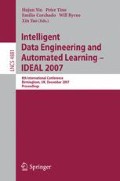Abstract
Since the development of pulse compression in the mid-1950’s the concept has become an indispensable feature of modern radar systems. A matched filter is used on reception to maximize the signal to noise ratio of the received signal. The actual waveforms that are transmitted are chosen to have an autocorrelation function with a narrow peak at zero time shift and the other values, referred to as sidelobes, as low as possible at all other times. A new approach to radar pulse compression is introduced, namely the Reproducing Kernel Hilbert Space (RKHS) method. This method reduces sidelobe levels significantly. The paper compares a second degree polynomial kernel RKHS method to a least squares and L 2P -norm mismatched filter, and concludes with a presentation of the representative testing results.
Access this chapter
Tax calculation will be finalised at checkout
Purchases are for personal use only
Preview
Unable to display preview. Download preview PDF.
References
Cook, C.E.: The early history of pulse compression radar-the history of pulse compression at Sperry Gyroscope Company. IEEE Transactions on Aerospace and Electronic Systems 24, 825–833 (1988)
Siebert, W.M.: The early history of pulse compression radar-the development of AN/FPS-17 coded-pulse radar at Lincoln Laboratory. IEEE Transactions on Aerospace and Electronic Systems 24, 833–837 (1988)
Cilliers, J.E., Smit, J.C.: Pulse Compression Sidelobe Reduction by Minimization of Lp-norms. Accepted for publication in IEEE Transactions on Aerospace and Electronic Systems (2007)
Lewis, B.L., Kretschmer, F.F., Shelton, W.W.: Aspects of Radar Signal Processing. Artech House, Norwood, MA (1986)
Aronszajn, N.: Theory of Reproducing Kernels. Transactions of the American Mathematical Society 68, 337–404 (1950)
Parzen, E.: Statistical Inference on Time Series by Hilbert Space Methods. Technical report, Department of Statistics, Stanford University, Technical Report No. 24 (1959)
Parzen, E.: Regression Analysis of Continuous Parameter Time Series. In: Proceedings of the Fourth Berkeley Symposium on Mathematical Statistics and Probability Theory, pp. 469–489. University of California Press, Berkeley, CA (1961)
Parzen, E.: An Approach to Time Series Analysis. The Annals of Mathematical Statistics 32, 337–404 (1961)
Kailath, T.: RKHS Approach to Detection and Estimation Problems—Part I: Deterministic Signals in Gaussian Noise. IEEE Transactions on Information Theory IT-17, 530–549 (1971)
Kailath, T., Duttweiler, D.: An RKHS Approach to Detection and Estimation Problems—Part II: Gaussian Signal Detection. IEEE Transactions on Information Theory IT-21, 15–23 (1975)
Kailath, T., Duttweiler, D.: An RKHS Approach to Detection and Estimation Problems—Part III: Generalized Innovations Representations and a Likelihood-Ratio Formula. IEEE Transactions on Information Theory IT-18, 730–745 (1972)
van Wyk, M.A., Durrani, T.S.: A Framework for Multi-Scale and Hybrid RKHS-Based Approximators. IEEE Transactions on Signal Processing 48, 3559–3568 (2000)
van Wyk, M.A., Durrani, T.S., van Wyk, B.J.: A RKHS Interpolator-Based Graph Matching Algorithm. IEEE Transactions on Pattern Analysis and Machine Intelligence 24, 988–995 (2002)
van Wyk, M.A.: Hilbert Space Methods for Non-linear Function Approximation and Filtering. Technical report, Tshwane University of Technology, CSIR / LEDGER, South Africa (2006)
Luenberger, D.G.: Optimization by Vector Space Methods. John Wiley and Sons, New York, NY (1969)
van Wyk, B.J., van Wyk, M.A., Noel, G.: Kernel-based Non-linear Template Matching. In: Fred, A., Caelli, T.M., Duin, R.P.W., Campilho, A., de Ridder, D. (eds.) SSPR 2004. LNCS, vol. 3138, pp. 831–839. Springer, Heidelberg (2004)
Mathworks: MATLAB Documentation - Neural Network Toolbox. Version 6.5.0.180913a Release 13 edn. Mathworks Inc., Natick, MA (2002)
Author information
Authors and Affiliations
Editor information
Rights and permissions
Copyright information
© 2007 Springer-Verlag Berlin Heidelberg
About this paper
Cite this paper
Jordaan, J.A., van Wyk, M.A., van Wyk, B.J. (2007). Reproducing Kernel Hilbert Space Methods to Reduce Pulse Compression Sidelobes. In: Yin, H., Tino, P., Corchado, E., Byrne, W., Yao, X. (eds) Intelligent Data Engineering and Automated Learning - IDEAL 2007. IDEAL 2007. Lecture Notes in Computer Science, vol 4881. Springer, Berlin, Heidelberg. https://doi.org/10.1007/978-3-540-77226-2_28
Download citation
DOI: https://doi.org/10.1007/978-3-540-77226-2_28
Publisher Name: Springer, Berlin, Heidelberg
Print ISBN: 978-3-540-77225-5
Online ISBN: 978-3-540-77226-2
eBook Packages: Computer ScienceComputer Science (R0)

